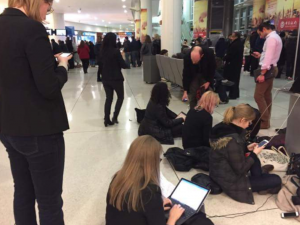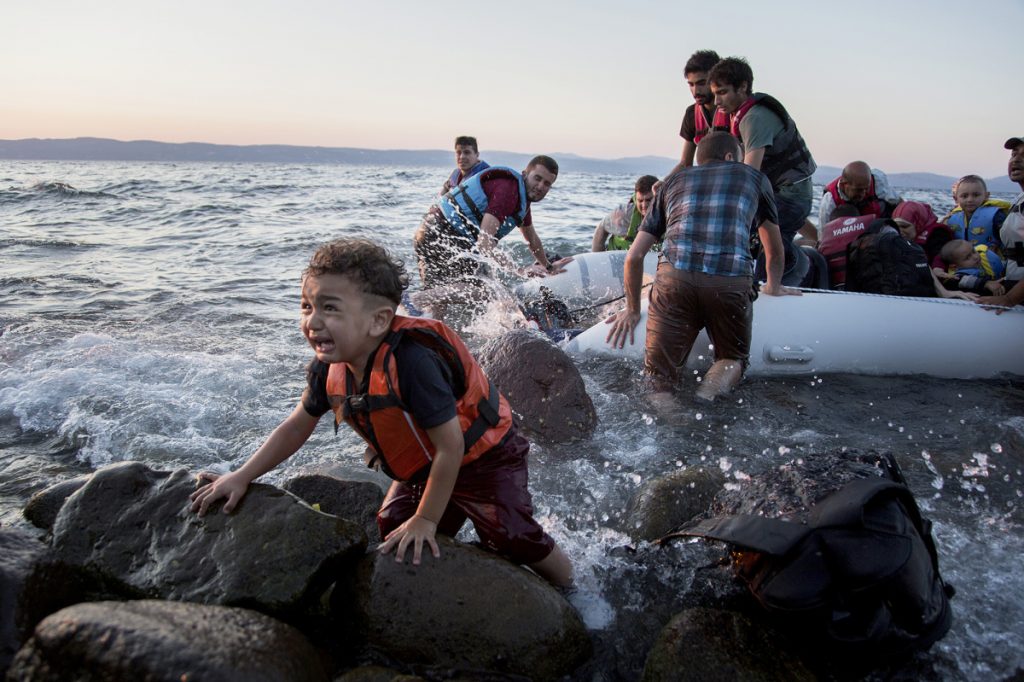Whether your church uses the Revised Common Lectionary or the Book of Common Prayer Lectionary, yesterday morning, you heard the Beatitudes, Matthew 5:1-2. “Blessed are those who hunger and thirst for righteousness, for they will be filled.” We also heard from the prophet Micah, “what does the LORD require of you but to do justice, and to love kindness, and to walk humbly with your God?” (6:8) The Psalm called us to “keep an oath, even to their hurt,” (15:4), and Paul reminded us to not try and boast in our own strength, “God chose what is weak in the world to shame the strong; God chose what is low and despised in the world, things that are not, to reduce to nothing things that are, so that no one might boast in the presence of God.” (I Corinthians 1:27-29)
These messages are particularly poignant in light of the executive order issued by President Trump on Friday, banning nationals from seven predominantly Muslim countries from entering the US. Public outcry has been widespread and has come from a range of groups, including conservative ones, such as Focus on Family. The president of that group opposed the ban, telling the Atlantic that “if we can verify [refugees] sincerity, and their story, as we’ve done for centuries, I think it would be wise to be open to a healthy immigration policy that allows people to flee.” Presiding Bishop Curry spoke out against earlier directives about immigration on the 25th, saying, “The refugees who enter the United States do so after experiencing violence and persecution undeserved of any human being, and they come to the U.S. with hopes to build new lives.” Many religious leaders of all faiths have spoken out vehemently against the ban.
The bitter irony of the executive order being issued on January 27th, the international day of remembrance of the Holocaust, has not gone unnoticed. Parallels were drawn between this decision and the US turning away Jewish refugees during WWII. A striking example is the MS St. Louis, a ship that was turned back by the US in 1939, even though officials knew by then what that meant for her passengers, Jewish Refugees. A Twitter account was set up to honor the 254 people from the St. Louis who were later murdered in the Holocaust.
The executive order has not just affected refugees, however. Legal residents with green cards have been turned away at the border or detained at the airport when they attempted to return from trips. Students and others, even with multiple entry visas, have found themselves in the same plight. People with dual citizenship cannot enter the country if one of their passports is from one of the seven named countries, regardless of where their second passport was issued. A 5 year-old boy was detained for hours at Dulles airport, separated from his mother, when he returned to the country with another family member (they have since been reunited). This is because of Sec. 3(c) of the executive order, which states “I hereby proclaim that the immigrant and nonimmigrant entry into the United States of aliens from countries referred to in section 217(a)(12) of the INA, 8 U.S.C. 1187(a)(12), would be detrimental to the interests of the United States, and I hereby suspend entry into the United States, as immigrants and nonimmigrants, of such persons for 90 days from the date of this order.” People who left the country for holidays, to go to weddings, for research trips… they have found themselves unexpectedly denied reentry, regardless of their visa or permanent resident status.
While the executive order does not explicitly target Muslims, all seven of the named “countries of concern “(Iraq, Syria, Iran, Libya, Somalia, Sudan, and Yemen) are predominantly Muslim. Furthermore, exceptions to the ban on immigrants and refugees may be made on certain conditions, “including when the person is a religious minority in his country of nationality facing religious persecution” (Sec. 5, subsec. e). Of course, in these countries, that essentially means Christians. However, the Bible is clear on whom we should regard as our neighbors, and whom we should treat with love and care (for example, the Parable of the Good Samaritan Luke 10:25-37).
Over the weekend, protests have blossomed at airports across the country, with lawyers filing habeas corpus writs and more, sitting on the floor by charging stations, or at temporary tables.

The ACLU and several other organizations have filed suits on behalf of those detained, resulting in four federal courts issuing orders against it (New York, Alexandria, Seattle, and Boston). Initially, customs officials refused to heed the judge’s order in New York, but it appears that they are now abiding by the ruling. Furthermore, in response to the protests, the White House has been attempting to tweak the executive order. John Kelly, Secretary of Homeland Security, released the following statement today: “Accordingly, absent the receipt of significant derogatory information indicating a serious threat to public safety and welfare, lawful permanent resident status will be a dispositive factor in our case-by-case determinations.” In other words, lawful permanent residents will not necessarily be granted entry, they will simply have a better chance.
This executive order is the very injustice we have been called as Christians to fight. Jesus commanded us to love one another (John 13:34). He has called us to care for those in need, “‘I was a stranger and you did not welcome me, naked and you did not give me clothing, sick and in prison and you did not visit me.’ Then they also will answer, ‘Lord, when was it that we saw you hungry or thirsty or a stranger or naked or sick or in prison, and did not take care of you?’ Then he will answer them, ‘Truly I tell you, just as you did not do it to one of the least of these, you did not do it to me.'” (Matt. 25:43-45). We must take care of the “leastof these,” as we are called to do. We must heed the message of today’s readings: to hunger and thirst for righteousness, to do justice, love kindness, and walk humbly with our God.
“Do not neglect to show hospitality to strangers, for by doing that some have entertained angels without knowing it.” (Hebrews 13:2)
All Bible verses from NRSV translation

